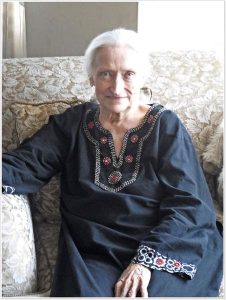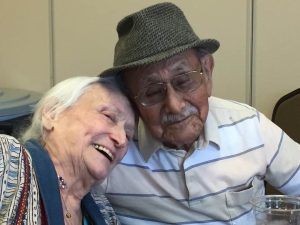Christopher Caldwell received the Octavia E. Butler Memorial Scholarship the very first year we gave it out. Here’s what he can say about what that was like:
I read Parable of the Sower when I was sixteen. I was a queer, precocious teen struggling with faith in Los Angeles and here was a strange, precocious, teen narrator struggling with faith in a fictional Los Angeles suburb in the near future. It wasn’t so much that I felt seen by the work as the realization that stories like mine were also worth telling. Until that point, my writing had mostly been imitative of what I thought great literature should be: white protagonists, heterosexual relationships, middle class agita unconcerned with the hows and whys of the status quo. Kindred had cracked the world open for me a year before, and Parable drove a wedge into that crack. I wanted to be more authentically me on the page and in my life.
I read a lot. And I wrote a lot, much of it pretty terrible. But I kept up with Ms. Butler’s career, and bought her latest books as soon as they came out. I listened and tried to internalize advice from “Furor Scribendi” and “Positive Obsession,” essays she had written about writing. My twin mantras became “forget talent” and “persist.”
I knew that she sometimes taught at Clarion West and Clarion workshops, and I assured myself that one day, when I felt good enough, I would apply during a year that she taught. That day never came, because she passed away in 2006, far too young. The grief you have for someone you have never met is a strange thing. But I promised myself the next year I would apply.
In 2007, I did apply. I could only afford one application, and I picked Clarion West because Samuel R. Delany was teaching. I didn’t think I would be accepted. I didn’t know how I could afford it if I was accepted. I didn’t know how I would take six weeks off from my terrible, high stress, low paying job. I was working nights and writing in that gap in the afternoon until it was time for me to return to work again. I didn’t even know if it was any good, but I told myself to stop worrying about talent and persist.
I was accepted. And I was elated. I didn’t know how I’d afford it. Then a second call came through, congratulations, you’re one of the first recipients of the Octavia E. Butler scholarships. I didn’t care then how I would take the six weeks off. I had to go. It felt like a calling. I’m not a superstitious person, but this felt as much like a sign as anything. I was enough, imperfect as I was and remain, to be chosen to receive this honor in the name of the writer I respected most in all the world.
The workshop was hard. I cried more than once. “Forget talent.” “Persist.” I did both and I turned in a story every week, sometimes staying up for 20 or more hours to do so. I felt I owed my best effort, and I gave it.
There’s a lot people can tell you about the workshop experience. For some people it helps them understand new ways to work, others value the connections and networks they develop. Some people blossom, others stop writing. But for me, receiving the scholarship and attending the workshop was sort of a contract. I must persist.
I’ve kept writing. I’ve kept giving my best. I’ve kept trying to bring something true and authentic to the world, even if it’s dressed up in lies, which, after all, is the business of fiction. I hope, without expectation, that something I write will crack the world open for some queer, brown teenager the way Kindred and Parable of the Sower cracked the world open for me. But the hope exists because I was honored and trusted with the Octavia E. Butler Memorial Scholarship.
MJ Hardman: A Remembrance
[After learning last month of the sudden death of Dr. MJ Hardman, we asked Carl Brandon Society co-founder Victor J. Raymond to write about her crucial contributions to our ongoing work. Though already in the grip of grief due to the death of his mother, he gave us the following words.]
We had gathered for the first caucus of People of Color at WisCon, about twenty years ago. Nalo Hopkinson and Nisi Shawl were there — that I remember — and other members of what would become the Carl Brandon Society Steering Committee were there. Like other spaces I had been in before, we knew this was a special moment. There were about a dozen people there, and it felt like we weren’t huddled together for safety, for belonging. That day, the metaphorical tent walls lifted away from our shoulders; we had the space to be who we were and to talk freely.
We were about to start when a mature woman entered the room. She appeared to be white, so we were not immediately sure if she knew where she was. We waited for a moment, and then she said, “I’m not a person of color, but I am the mother of people of color.” We had not discussed how to handle this beforehand, but Nalo nodded and graciously invited her to join us. We could decide for ourselves who was a part of our community, and MJ immediately was included.
This is how MJ Hardman introduced herself to us. And from her we learned so much, oh, how we learned. MJ was an avid science fiction reader, a professor of linguistics, a fierce champion of indigenous rights, a mother, a feminist, and much more. MJ served on the Carl Brandon Steering Committee for nearly 15 years, and we benefited greatly from her presence and contributions.
MJ — for that was how we knew her, never as “Dr. Hardman” (she never stood on ceremony) — was a persistent advocate for unvoiced and underrepresented viewpoints in our work as the Carl Brandon Society. She worked to ensure that the Society’s efforts went beyond the United States, that we paid attention to writers and readers of color in other countries, and that we never forgot the feminist origins of our creation.
When we first began working on the Carl Brandon Parallax and Kindred Awards, MJ championed naming them as we did. “Parallax” — to recognize the breadth of who we were, the entire rainbow of the chromatic spectrum, and “Kindred” — first as an acknowledgment of Octavia E. Butler, an early supporter of our efforts, and second, to recognize that we were all associated, and connected to one another. We chose those names because MJ passionately advocated for them, and we soon realized why her advocacy mattered: they spoke to our shared values.
When the Society took on the challenge to support the Octavia E. Butler Memorial Scholarship for writers of color attending Clarion and Clarion West, it strained relationships amongst the members of the Steering Committee. MJ worked to mend those relationships, pointing out that fostering new voices in the field was an important thing for us to do — and there was nobody else who could do it. Over the past decade and more, we have seen the result of that wisdom: more than two dozen writers of color producing outstanding, brilliant creative work after graduating successfully from Clarion and Clarion West.
Over time, we slowly began to see the rest of MJ’s life. MJ saw connections between linguistics, worldview, and speculative fiction. How we speak influences how we think and how we see the world, now and in the future, and those connections were the foundation for her support for our work. I remember meeting her husband, Dimas, at WisCon; they clearly loved one another — Dimas, quiet and bespectacled, and MJ laughing and talking and challenging us to do the right thing (whatever it was in the moment). After knowing them for some time, I found out about his and MJ’s efforts to preserve Jaqaru, his native language. Because of that, it was possible to appreciate the connections MJ made between the important interests in her life. Once she retired from her position at University of Florida, she provided advice and support for the Society, and continued to advocate for, and on behalf of, the Parallax and Kindred awards.
For quite some time, the Carl Brandon Society operated on a shoestring budget — we still do, really. MJ’s academic work kept her focused on the needs of her community and family in Peru, but the Carl Brandon Society is a beneficiary of her estate. Her support will help build a stronger and more capable organization, one that she would be very proud of having helped to start.
Victor J. Raymond


What we’ve been getting up to
We just filed our annual tax return with the IRS, which meant that we reviewed what we’ve done recently. We want our supporters to know at least as much about that as the IRS does, so here goes.
2020 was a pivot year for most people and organizations, as we all struggled to deal with the sudden changes required by the pandemic and by the public response to the killing of George Floyd. Our response to the pandemic was to switch from in-person events to online events. The Carl Brandon Society presented five programs online during 2020. Our world became bigger, not smaller, even as we all stayed inside. Average attendance at these online panels was 45, with 88 attendees at the most popular. The panels continue to be available on YouTube.
The response to the killing of George Floyd included an outpouring of donations to organizations that grapple with issues of race. Since the Carl Brandon Society’s mission is to increase racial and ethnic diversity in the production of and audience for speculative fiction, we were among the organizations that received much larger donations than usual, which has positioned us to be able to serve our community in more ways. We are currently working on how best to use these resources, both short-term and long-term.
2021 was a growing year, building on 2020’s success. We presented two online panels similar to those held in 2020. In addition, we held two online town halls to gather ideas from our community about what we should do next, attended by writers and editors of color from countries worldwide to give us direction about what resources of those that we can provide are most needed now. In 2022, we will begin holding workshops by and for writers and editors of color developed in response to the 2021 town halls.
In July, 2021, we sponsored a party/gathering space for BIPoC at CONvergence, an annual convention for fans of science fiction and fantasy in Minneapolis. It was our only in-person event during the pandemic so far.
In 2020, Akwaeke Emezi received the 2019 Parallax Award for a work of speculative fiction created by a self-identified person of color for their novel Pet. Michele Tracy Berger received the 2019 Kindred Award for a work of speculative fiction dealing with issues of race and ethnicity for her story “Doll Seed.” Going forward, we have expanded our Kindred and Parallax awards to include separate awards for short fiction and novels, with a $1000 honorarium for each of the four awards. As with other organizations, the pandemic has interfered with some of our normal operations. We expect to name recipients of these awards for works published in 2020 and 2021 by year-end 2022.
In 2020 and 2021, because of the pandemic, neither Clarion in San Diego nor Clarion West in Seattle held an in-person workshop. In 2021, Clarion West held their six-week summer workshop online rather than in person, while Clarion in San Diego deferred for another year. We granted two Octavia E. Butler Memorial Scholarships to students participating in the online Clarion West workshop — double the number we’re committed to granting annually. For 2022, both workshops are back to in-person attendance, with Clarion West having a mix of students originally admitted in 2020 and those admitted this year, and Clarion in San Diego having only those students admitted in 2020. We have granted a total of three Butler scholarships for these 2022 in-person six-week summer workshops.
We’re serving as the fiscal sponsor for Hydra House’s Ex Marginalia project, a book of essays about writing by authors who will not and cannot remain in the margins. Scheduled for publication in Fall/Winter 2022, the nonfiction collection is edited by multiple award-nominated author, editor, and 2014 Octavia E. Butler scholar Chinelo Onwualu.
We’re excited about what we’ve been able to accomplish in the past few years, and we look forward to doing more. We especially look forward to being able to get together again in person, while keeping on with the remote events that allow for more access to more members of our community.
K. Tempest Bradford, Maurice Broaddus, Candra K. Gill, Jaymee Goh, Kate Schaefer, Nisi Shawl, and Yang-Yang Wang
The Carl Brandon Society Steering Committee
PS: Thanks again for all you’ve done to make this possible! Please consider continuing to support our work by making a tax-deductible donation at carlbrandon.org/donate/.
